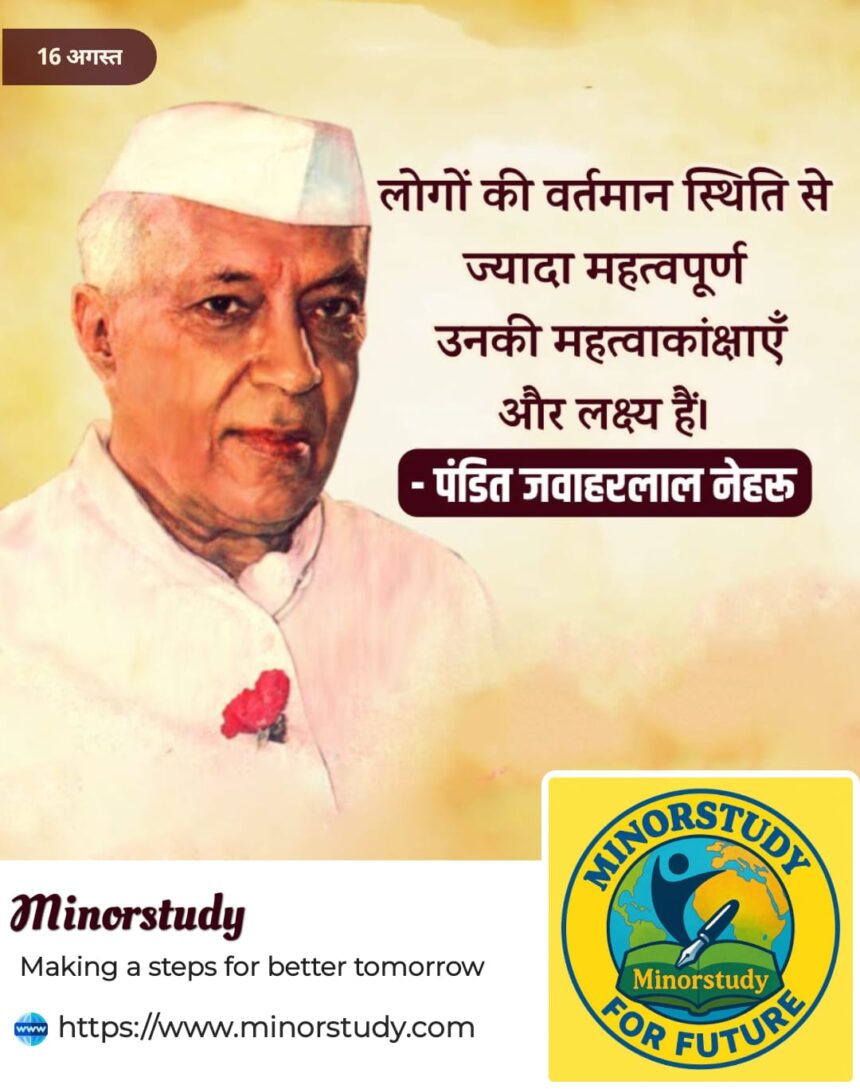7 Inspiring Lessons From Jawaharlal Nehru That Will Transform Your Vision of Progress
Pandit Jawaharlal Nehru, India’s first Prime Minister, played a pivotal role in shaping modern India. His quote, “The aspirations and goals of the people are more important than their present condition,” emphasizes the importance of vision, hope, and long-term development. It reflects his belief in the power of people’s dreams as the driving force behind national progress.
- History and Background of Jawaharlal Nehru
- Timeline of Jawaharlal Nehru’s Life
- Key Facts About Jawaharlal Nehru
- Significance of the Quote
- 7 Lessons From Jawaharlal Nehru’s Life
- 1. Visionary Thinking
- 2. Education as Empowerment
- 3. Focus on Development
- 4. Democracy and People-Centric Governance
- 5. Scientific Temper and Innovation
- 6. Patience and Perseverance
- 7. Legacy of Inspiration
- FAQs About Jawaharlal Nehru
- Daily Life Lessons From Jawaharlal Nehru
- Societal and Cultural Impact
- Wishing and Celebrating Jawaharlal Nehru
- Important Points to Remember
- Conclusion: Jawaharlal Nehru’s Visionary Legacy
This article explores Nehru’s life, achievements, timeline, philosophy, significance, societal impact, and lessons for personal and professional growth, in a human-friendly style.
History and Background of Jawaharlal Nehru
Born on 14 November 1889 in Allahabad, India, Jawaharlal Nehru belonged to a wealthy and politically active family. Educated in England at Harrow School and Cambridge University, and trained in law at Inner Temple, London, he returned to India to join the Indian independence movement.
Nehru was inspired by Mahatma Gandhi and became a key leader of the Indian National Congress, advocating democracy, social justice, and scientific progress. After India’s independence in 1947, he became the nation’s first Prime Minister, serving until his death in 1964.
Timeline of Jawaharlal Nehru’s Life
1889: Born in Allahabad.
1912: Returned to India after completing education in England.
1919: Joined the Indian independence movement, influenced by Gandhi.
1929: Advocated complete independence for India in Congress sessions.
1947: India gained independence; Nehru became first Prime Minister.
1947–1964: Focused on nation-building, industrialization, education, and democracy.
1964: Passed away on 27 May, leaving a legacy of visionary leadership.
Key Facts About Jawaharlal Nehru
Known as “Chacha Nehru”, especially beloved by children for his focus on education and welfare.
Emphasized scientific temper, modern education, and technological progress in India.
Advocated for democracy, secularism, and social justice.
Wrote books such as “Glimpses of World History” and “The Discovery of India”.
Initiated key projects like Five-Year Plans, industrialization programs, and the Green Revolution foundations.
Significance of the Quote
“The aspirations and goals of the people are more important than their present condition.”
This statement holds deep meaning:
Vision Over Circumstance: Nehru emphasized long-term goals over current challenges, urging leaders to focus on the future.
Empowering the People: By valuing aspirations, he acknowledged the power of collective dreams in shaping society.
Progress Mindset: Encourages planning, education, and investment in human capital rather than being limited by present difficulties.
Inspiration for Modern Leadership: Leaders and individuals are reminded to prioritize purpose, goals, and potential over immediate limitations.
7 Lessons From Jawaharlal Nehru’s Life
1. Visionary Thinking
Nehru believed that a nation’s future depends on the dreams and ambitions of its people, highlighting the importance of long-term planning and strategy.
2. Education as Empowerment
He prioritized education for children and youth, emphasizing that knowledge and aspirations shape a country’s progress.
3. Focus on Development
Nehru implemented industrialization, infrastructure projects, and Five-Year Plans, demonstrating how goals drive action beyond present conditions.
4. Democracy and People-Centric Governance
He emphasized democratic governance, ensuring that policies reflect citizens’ aspirations, not just immediate convenience.
5. Scientific Temper and Innovation
By promoting science, research, and technology, he showed that human potential and goals are more important than current limitations.
6. Patience and Perseverance
Nehru’s leadership demonstrates that long-term change requires perseverance, patience, and dedication to vision.
7. Legacy of Inspiration
His work continues to inspire leaders, students, and citizens, proving that valuing aspirations over present condition can create lasting impact.
FAQs About Jawaharlal Nehru
Q1: Who was Jawaharlal Nehru?
A: Nehru was India’s first Prime Minister and a central leader of the Indian independence movement.
Q2: What is the meaning of his quote?
A: It emphasizes that people’s dreams and goals guide progress, and leaders should prioritize aspirations over current challenges.
Q3: How did he influence modern India?
A: Through industrialization, education, science promotion, democracy, and social welfare policies.
Q4: Why is he called “Chacha Nehru”?
A: Due to his affection for children and efforts to promote child welfare and education.
Q5: What can modern readers learn from Nehru?
A: Lessons in visionary thinking, perseverance, valuing aspirations, and people-centered leadership.
Q6: What were his major contributions?
A: Five-Year Plans, industrial development, educational reforms, scientific research, and democratic governance.
Daily Life Lessons From Jawaharlal Nehru
Focus on Goals: Prioritize your long-term aspirations over temporary setbacks.
Value Education: Knowledge is a key tool to achieve personal and societal goals.
Think Strategically: Plan and act with a vision beyond current conditions.
Serve People: Decisions and actions should benefit society and support collective dreams.
Embrace Innovation: Use science, technology, and creativity to overcome limitations.
Persistence Matters: Change takes time; perseverance and patience are crucial.
Societal and Cultural Impact
Nehru’s vision fostered modern education, scientific research, and industrial development.
His philosophy empowered children, youth, and citizens to dream big and pursue ambitions.
Promoted secularism, democracy, and collective decision-making, shaping India’s societal values.
His legacy continues in institutions, policies, and national consciousness, reinforcing the importance of aspirations over present limitations.
Inspires leaders globally to prioritize vision and long-term goals for societal progress.
Wishing and Celebrating Jawaharlal Nehru
People honor him with blessings and reflections:
“May the vision and dreams of Nehru inspire you to rise above challenges and achieve your goals.”
“Let his emphasis on people’s aspirations guide you toward leadership, education, and innovation.”
National celebrations, such as Children’s Day (14 November), commemorate his legacy, reflecting his love for education and societal progress.
Important Points to Remember
True progress prioritizes aspirations and goals over immediate conditions.
Leadership requires vision, foresight, and people-centric policies.
Nehru’s philosophy teaches patience, perseverance, and commitment to long-term change.
Studying his life encourages strategic thinking, education, and innovation.
His teachings remain relevant for personal growth, leadership, and national development.
Conclusion: Jawaharlal Nehru’s Visionary Legacy
Pandit Jawaharlal Nehru’s life and words remind us that aspirations, not present circumstances, define progress. His quote, “The aspirations and goals of the people are more important than their present condition,” emphasizes the power of vision, hope, and long-term planning.
By valuing dreams, empowering people, and fostering education and innovation, Nehru created a lasting impact on India and the world. His legacy teaches us that true progress requires foresight, courage, and dedication to the aspirations of people, ensuring a brighter future beyond immediate challenges.








